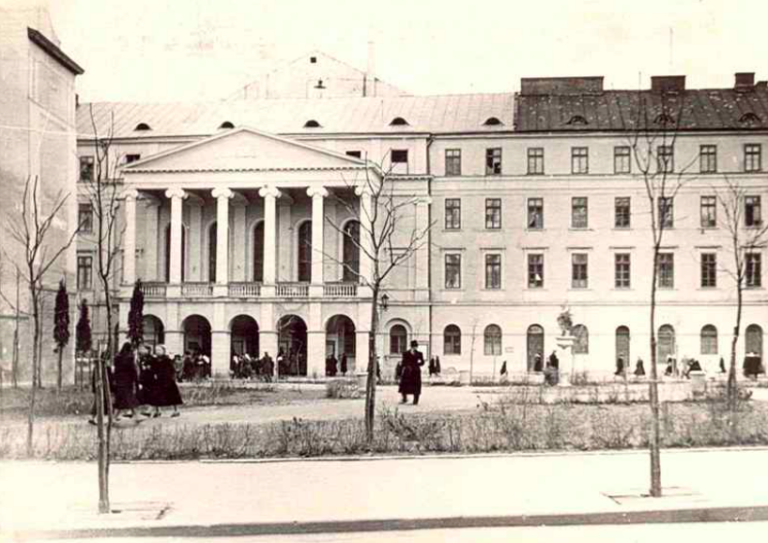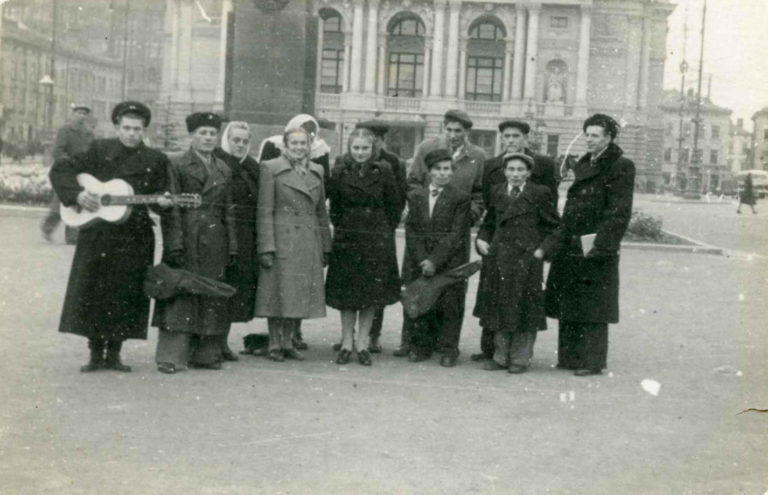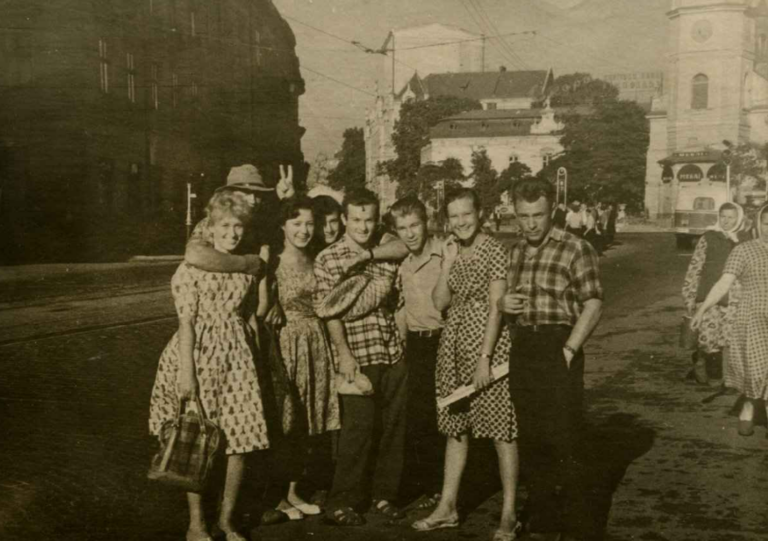Р: Well and that’s how we lived until 1939, and then that’s when the war started, you know, and that’s how it was: the Germans, the Russians, the Germans, the Russians, and so on in that way… I went and studied for a year, took the exam, in the second year there’s an announcement: “In the Zankovetska Theater a theater studio is opening,” and even before that I was in the Opera, I had gone to the ballet studio and had already been in the ballet for two years, when Iaroslavtsev was there, maybe you know him, he was a homosexual, but he was a really good teacher, he beat us on the leg, if I did not place my leg right at the barre, you know, how teachers are. Well, so I was already in Swan Lake in the mass scenes [corps scenes]—I already danced there, but then I thought to myself, what kind of ballerina am I? I have short arms, short legs, and a ballerina, she’ll never be a prima if she has short arms, because you know, you have to have such long arms, long legs, then you can be a prima, but as it is it’s the corps de ballet—so what’s that for me? I went to the Zankovetska. And I really loved theater, even under the Germans I went to see shows, my God, I even saw that Blavatsky, the founder of the Ukrainian theater, in the Opera Theater it was, there was Kryvytska she was a famous heroine, Lesia Kryvytska, and Lesia then left the theater and worked in the Zankovetska … I remember now this one show, I really remember it well, “The Triumph of Procurer Dalskii,” there was such a show—it was against Soviet power, this was under the Germans. …[when in the studio] I didn’t love anything, no going out/parties, other girls loved to go dancing, some dances or some such, but not me—I was only studying theater from morning to evening, in the morning I study all day and then at night I see shows. What amazing shows were at the Zankovetska theater, my God, “Marusia Bohuslavska,” “Nazar Stodolia,” and what actors there were, Danchenko, Serhii Dancehnko’s father, Volodia Danchenko he was an actor , he played Nazar, handsome, there were mass scenes, parties, [in the show] when I was in the studio you know, and in the first year they did not let you know on stage, but on the second year they took you for the mass scenes, so in Forest Song I was already dancing in a tunic, like the mermaids, the water mermaids, the field mermaids. And Nazar Stodolia there were also Ukrainian dances, I also led those, because I was the smallest, so I was the first to lead these Ukrainian dances, well and it was great for me, like all the shows at the Zankovetska . “Platon Krechet” in the secondy year—they even gave me the role of Maika [Maya] in this Platon Krechet, you know, the girl with the skirt, a bare ass, and I’m jumping around (laughs)…
І: In what year did you arrive in the Zankovetska theater studio?
Р: In which year? In [19]45, the war had not even ended, because on 9 May, Vicotry Day, I was already in the theater studio, so at some point in the beginning of 1945 they made this studio, the first postwar studio. …
І: And you stayed to work at the Zankovestka theater?
Р: Yes, they kept Borys Mirus and me, but Boris went up and left for Kyiv, he wanted to go to the institute, and they caught him right in Kyiv, and I escaped, because my husband…..I remember that he said to me: “Slava, you go from the theater, go from the theater.” As I’m finishing [the course] I am thinking: “Well why does he want to rip me away from the theater?” I had just started to work and he’s telling me, “Go from the theater.” Clearly, he was already called to the KGB and he was afraid that they would arrest me too.
[Her husband is arrested.]
Р: It was [19]49, I think, it was [19]48 or [19]49, I don’t remember, but somewhere in these years because I graduated in [19]48, worked for a year, it was somewhere in [19]49.And so I stayed, I escaped from the theater because I thought, they’ll take me, and I have two old parents and my brother is still young ..
І: And why did they take him?
…
Р: You’d have to go to the KGB and ask why they took him. For nothing. I think that, you know, it was this: it was like this in Ukraine in [19]20, [19]22, that all Banduristy, even the blind Kobzary, they gathered them up, as if for a concert and then they shot them all. So clearly …and my husband, it’s true that Broys was not a Bandurist, there was Stetsko who was a Bandurist, Vasylkivskyi was a Bandurist, they had a kapelle of Banduristy, you know there was this one, what was his name, this director, it was on Korolenko Street…it was there in this building of arts, where the puppet theater started.
І: There’s some kind of Russian cultural center there now. [renovated in 2017 to a Building of Soldier]
Р: So it seems to me that they caught them because they went to concerts, you know, they were with their banduras in sharovary, in the embroidered shirts, they went around to villages to play concerts, whell and clearly they did not like that.
І: So it was a big group that was then taken?
Р: Well, yes, so they took, there was this Oleh Hasiuk, a really good actor, he was older than us by a bit, but he was working in the theater already and then he got married, and they took his wife away with their small child in the train in those, you know, they took these people in these cattle cars, it was a nightmare, I can’t even convey to you, you know, it’s not possible to tell about this without tears, what this was, how terrifying life was. God forbid that anyone should ever know what I saw and what I experienced. And yes that little child died in the train…
… So they also arrested him [her husband] for ten years, they were [in jail in] in Kyiv, because I went there the entire year because he would not confess. He says: “I don’t have anything to confess.” “Confess, sign this, sign,” he was telling me later, but he says: « What can I sign if I haven’t done anything?” They wrote what they wanted for them to sign. And when the older people were at the KGB, they were in the basement, the entire year he was there and the entire year I brought him packages. Each month. Snow, cold. That’s why my legs are sick. And I was in canvas shoes, I didn’t have any boots then, because it was such povery after the war, you know. There was nothing to put on your feet, nothing to wear. Good god. And then…he told me. He says: “Slava, he’s telling me, “Sign and sign.” And I finally did it. He says—the boys who were older who were there from Kyiv, there were even Jews there, and Russians were there, there were some young professors. And they tell me:” Sign, because if you don’t sign they will putrefy you, or kill you, or putrefy you in that basement, you’ll be sitting there a year…you won’t make it.” Well and he confessed that he led some agitation in a kolhosp against the kolhosp. What kolhosp? Яку він колгосп? Wbere is that collective farm in Klevan. He is from Rivne oblast, from Rivne region. His mom has higher education, from an Austrian high school, not Austrian, but Tsarist because they were under the Tsar, Volyn was under the Tsar and her brother was also a teacher, also under the Tsar, also finished this high school, and then they all met in Kazakhstan: him, and his nephew, my husband, what they arrested that poor teacher for I don’t know. At that time they just arrested you: whether they had to or not—there it is and you’re in the cart and 10 years with no trial and no investigation. Moscow gave it all [in terms of sentences], the Russian trinity and that’s it. The Moscow troika, that’s how it was. It was that time..
І: Then they transferred them from Kyiv?
Р: And from Kyiv they sent them to a camp, Moscow sentenced them to ten years, and Mirus was sent somewhere in Kolyma, he was somewhere in Vorkuta, in the mines, because he was strong, that’s who Borys was. And [my husband] they sent to Kazakhstan, so he met his uncle there, his uncle was imprisoned there and then I myself went there.
І: You went there?
Р: Yes, I went, because he wrote me. He says: «What am I to do?». Because when Stalin died, then it was a bit easier, they already believed that they were no kind of criminals, but he already worked there, already he was a free hired hand, he had a little room they had given him, basically he was already not in the camp. And he was working as the boss of the Asphalt-concrete factory, he was building roads, he built Baikonur, where those rockets flew from, it’s near where we lived—Baikonur was really not far, maybe 100 kilometers, maybe, how many times did they go there, taking cement, asphalt, they did all the roads. But, he says, there they do not let us [in] they barricaded it up and took the goods and sent us away. That’s how it was…
Р: … And I was already pulled into work, I was working in a school, I made a chorus for them, 120 people, and I also thought up: the choir sings, and the girls dance, the 1st-2nd-3rd grades, with little Hutsul Toivo costumes. The costumes we all sewed, the moms sewed, we all sewed together.
І: Hutsul costumes?
Р: Yes .. And I taught them to sing «Verkhovyna, you are our world! How sweet you are here!” So the choir sang, and then, “Oy, there is no land, no land like Verkhovyna. If only I could walk here one more minute.” And my girls jumped out ta this melody and the boys, the boys in sharovary pants, and they dance, they present dances. There was such an ovation, the entire hall called out, because there were a lot of Ukrainains there, mostly those who were arrested and served their sentences there, they got re-married and stayed there, because they were not allowed to return home to Ukraine. So they set themselves up with work, Ukrainians married with Lithuanians……So then she sends me a telegram: “Slava, come back, because grandma is dying.” I was in shock, as I was sitting there, then I stood, I got on the plane and flew away, I took nothing with me, just like that, just my underwear….and I arrived and I said:”That’s it, I’m not going anywhere again, leaving my sick grandma and sick old dad and unmarried brother.” I couldn’t go anywhere, and I wrote him [her husband] a letter and I say: “Go to the directors, get my work papers, gather all my documents, I am not coming back, I cannot, I cannot leave them, there’s no one else.” So I didn’t’ go, and I’d already met Tania, Tania set me up in the puppet theater, because there was nowhere in the Gorkyi Theater [of young spectators]…. But that’s fate, you’ll never escape fate, everything had to happen as it happened.




This is an excerpt from an interview with an actress in Lviv made in 2013. This actress talks about her wartime experience under German occupation and touches on the various cultural institutions she attended during the war. She went to the Lviv Opera Theater, run 1941-1944 by famous actor and director Volodymyr Blavatsky, who had worked with Kurbas’ Berezil and created a name for himself in avant-garde theater in Poland. He left for the west in 1944. She notes Lesia Kryvytska, an actress who worked in interwar Poland, Nazi-occupied Lviv, and then settled at the Maria Zankovetska Theater in postwar Lviv. She also mentions studying ballet at the Opera’s dance studio. Her mention of the sexuality of famous dancer Oleksandr Iaroslavtsev (1906-1968), who ran the ballet studio under German occupation, may give us pause today. Let’s think what her language might tell us about sexual norms in artistic society, and in the larger Galician world in which she grew up. Then her narrative shifts to joining the studio run by the Zankovetska Theater, which came to Lviv from evacuation in 1944 – that is, before the war ended. Clearly, culture was a part of the massive project of bringing this region under Soviet rule. Yet those who were a part of this cultural project were not spared its violence. Her narrative shifts again into a story of postwar oppression of anyone suspected of Ukrainian nationalism, including her husband. Yet the narrative continues to shift, to her description of her time in Kazakhstan, where she accompanied her husband during his Gulag sentence and beyond. He was involved in building the Baikonur Cosmodrome, which opened in 1955 and was the location from which all Soviet space flights launched. She, meanwhile, worked in Ukrainian culture since there were many Ukrainians in the region, presumably many with stories similar to hers. This source can raise questions about life stories: what does she include in her story? What might she not include here? This source also challenges our chronology for World War II, since her story seems to include so much of the postwar suppression of Ukrainian nationalism and the violence of Sovietization. This source can also challenge us to think about genres and categories – after all, this is a source about Ukrainian nationalism, cultural life under occupation, and also the space race. We can also pay attention to the ways in which the arts function in her narrative: art is fun, a passion, a job, and a way of preserving culture in exile.